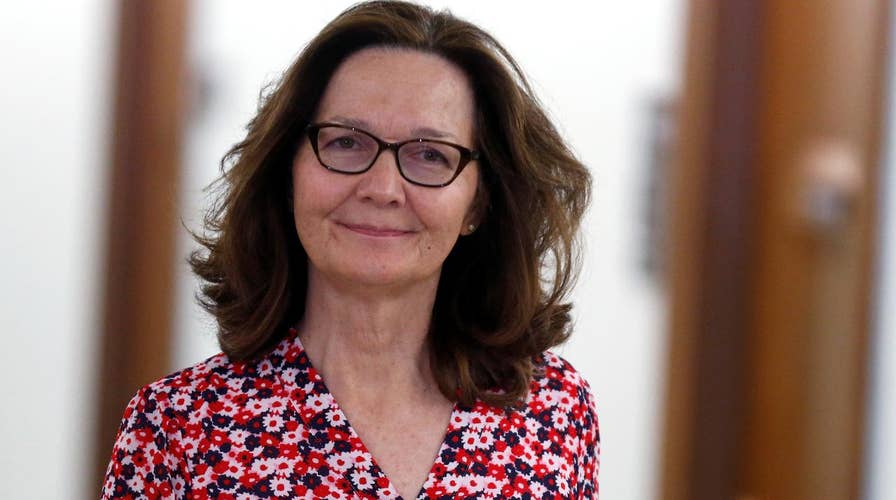White House says Haspel is the right person to lead the CIA
Media microscope turns on President Trump's pick to run the CIA ahead of confirmation hearing; reaction and analysis on 'The Five.'
President Trump’s nominee to lead the CIA, Gina Haspel, faces an uphill battle this week as Democratic senators push back against her confirmation to become America’s top spy.
Democratic Senators Dianne Feinstein of California and Ron Wyden of Oregon have accused Haspel, who has spent her entire career at the CIA, of grave misconduct in supporting the agency’s interrogation programs involving suspected Al Qaeda operatives in the early 2000s.
While Haspel’s involvement certainly deserves appropriate scrutiny, there’s no question that she remains well-qualified for the job of CIA director.
Indeed, Haspel has had a long, successful career battling America’s traditional enemies – most especially the Russians – along with newer threats like ISIS and other organizations engaging in radical Islamic terrorism. She’s also earned broad, bipartisan support from former intelligence professionals who understand both her tenacity and intellect.
In short, Haspel would be ready to fight for America on Day One.
Yet for the rank and file of the CIA, Haspel also represents something of personal importance: a trusted, inspired sister-in-arms who has thrived in a culture not known for its embrace of women.
In fact, Haspel is the agency’s best chance to break its stubborn glass ceiling and build a diverse spy service that’s forever one step ahead of America’s enemies.
Here’s why that matters.
In 2013, the CIA released an internal report that offered a stark picture for female operatives at the agency. Only 19 percent of the most senior leaders were women.
The official reasons varied – a lack of mentorship, devaluing certain career paths, and an inflexible work schedule. Left unsaid, however, were the many anecdotes of sexual harassment that I heard from female officers during the course of my CIA career.
Consider the story of a woman I will call “Lauren” to keep her identity undisclosed.
Lauren was an analyst focused on thwarting rogue nations as they sought to acquire nuclear, chemical, and biological weapons. Early on in Lauren’s career, a supervisor – I’ll call him “Jim” – explicitly told her that he could get her promoted more quickly if she agreed to have sex with him.
If, however, she refused, Jim warned that her career would go nowhere.
When I asked Lauren whether she had reported Jim to agency authorities, she said she had not. She explained that there was a culture of retaliation for officers who alleged sexual harassment and she highlighted Jim as an example.
“He harassed another woman a few years ago and she reported him, just like she was supposed to,” Lauren told me. “But you know what Human Resources did?”
Lauren took a deep breath and told me: “They asked her if she had worn provocative clothing.”
Apparently, Jim had offered this up as rationale for his behavior. Unfortunately, he went unpunished.
And the woman who complained? Her career tanked. “Nobody wanted her,” Lauren said flatly. “She was labeled a ‘troublemaker.’”
Lauren’s experience – and the agency’s anemic response – weren’t isolated instances. During my time at the CIA I spoke with women across the agency’s departments and at different stages in their careers. Many relayed similarly painful stories. While some chose to soldier on in silence, others simply left.
It may be tempting to label these women’s experiences as common, even if horribly so. Yet these stories are far more. They are national security issues.
When America handicaps or loses its female spies, the country has fewer clandestine officers to keep us safe.
This includes operational giants like Virginia Hall, a fabled spy who worked behind enemy lines in World War II to organize agent networks and assist escaped prisoners of war. Later, as the Soviet empire grew, she helped lead resistance movements against the Communist forces sweeping Eastern and Central Europe.
Or consider Jennifer Matthews, a tenacious counter-terrorism officer and mother of three who was killed when a triple agent ignited a hidden suicide vest in Afghanistan back in 2009.
The death of Matthews was deeply personal for many younger officers, including me. She was one of my first managers and leaders on a special project targeting a terrorist network soon after the Sept. 11, 2001 terrorist attacks.
Gina Haspel’s elevation as CIA director would thus be a key milestone for the agency, and a tribute to women like Lauren, Virginia, and Jennifer. It would signal that these brave officers – and all those who remain in silent service – are second to none. Indeed, their sacrifices are no less notable or commendable than those of their male counterparts.
And as for those predatory men and their protectors that still report for duty at the agency? Making Haspel CIA director would be put them on firm notice that a new day has dawned. Consequences await.
Yet it’s not just those at the CIA who would benefit from a boost in morale and inspiration. Making a qualified woman CIA director would also be an important boost for the country.
America needs all of us – women and men alike – to serve and protect our great nation. With a profoundly qualified female director at the helm, it would be a proud reminder that there is a seat at America’s table for anyone who is willing to devote themselves to a higher cause.
So let our senators ask Haspel tough questions. But let us also remember that in these times of turbulence – from the troubled Iran nuclear deal to North Korean peace talks, not to mention Russian and Chinese aggression – a CIA Director Haspel would know our adversaries well. She and my former colleagues would use their experience and fortitude to break them.
In doing so, Gina Haspel would also break one of America’s last and most enduring glass ceilings.
No matter your political party, that would be a moment worth celebrating.









































